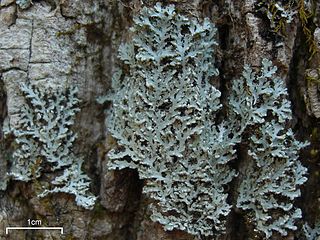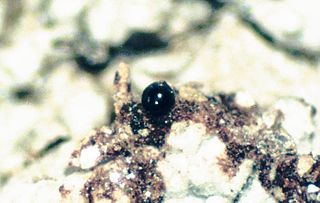
The Graphidaceae are a family of lichen-forming fungi in the order Graphidales. The family contains nearly a hundred genera and more than 2000 species. Although the family has a cosmopolitan distribution, most Graphidaceae species occur in tropical regions, and typically grow on bark.

Phaeographis is a genus of lichen-forming fungi in the family Graphidaceae. It has an estimated 180 species.
Frutidella is a genus of lichen-forming fungi in the family Ramalinaceae. It contains three species. The genus was circumscribed in 1994 by Klaus Kalb to contain the species formerly known as Lecidea caesioatra.
Bapalmuia is a genus of lichen-forming fungi in the family Pilocarpaceae.
Sporopodium is a genus of lichen-forming fungi in the family Pilocarpaceae.

Lopadium is a genus of lichen-forming fungi in the monotypic family Lopadiaceae, which is in the order Lecideales. The genus contains 10 species. Lopadium was circumscribed by German lichenologist Gustav Wilhelm Körber in 1855.

Heterodermia is a genus of lichenized fungi in the family Physciaceae. The genus has a widespread distribution, especially in tropical regions, and contains about 80 species.

Diploicia is a genus of lichenized fungi in the family Caliciaceae. The genus has a widespread distribution, especially in temperate regions, and contains 6 species.

Pyxine is a genus of foliose lichens in the family Caliciaceae. The genus has a widespread distribution in tropical regions.

Physconia is a genus of lichen-forming fungi in the family Physciaceae. It has about 25 species. The genus was circumscribed by Czech lichenologist Josef Poelt in 1965, with Physconia pulverulenta assigned as the type species.
Thelocarpon is a genus of fungi in the family Thelocarpaceae.
Zahlbrucknerella is a genus of filamentous, rock-dwelling lichens in the family Lichinaceae.

Phaeocalicium is a genus of lichen-forming fungi in the family Mycocaliciaceae. The genus was circumscribed in 1970 by German lichenologist Alexander Schmidt, with Phaeocalicium praecedens assigned as the type species.

Sphinctrina is a genus of lichenicolous fungi, usually not lichenized, in the family Sphinctrinaceae. Its species are most commonly parasitic on lichens of the genus Pertusaria.

Ramonia is a genus of lichenized fungi in the family Gyalectaceae. It contains 24 species. The genus was circumscribed by Ernst Stizenberger in 1862.

Dibaeis is a genus of lichen-forming fungi in the family Icmadophilaceae. The genus is widely distributed in tropical regions. Dibaeis was circumscribed in 1909 by Frederic Edward Clements with Dibaeis rosea as the type species. Several species were transferred from other genera in a 1993 publication.
Vezdaea is a genus of crustose lichens in the monotypic family Vezdaeaceae, which itself is the only taxon in the order Vezdaeales. The genus was circumscribed by Elisabeth Tschermak-Woess and Josef Poelt in 1976. The genus name honours Czech lichenologist Antonín Vězda (1920-2008).

Melaspilea is a genus of lichen-forming and lichenicolous fungi in the family Melaspileaceae. The genus was circumscribed by Finnish lichenologist William Nylander in 1857.
Brasilicia is a genus of leaf-dwelling lichens in the family Pilocarpaceae. It has 6 species. The genus was circumscribed in 2008 by lichenologists Robert Lücking, Klaus Kalb, and Emmanuël Sérusiaux, with B. brasiliensis assigned as the type species. The genus was originally circumscribed as monotypic; Edit Farkas transferred five species to Brasilicia from Bacidia in 2015.
Kalbographa is a genus of lichen-forming fungi in the family Graphidaceae. The genus was circumscribed in 2007 by lichenologist Robert Lücking with Kalbographa caracasana assigned as the type species. The genus name honours German lichenologist Klaus Kalb.












